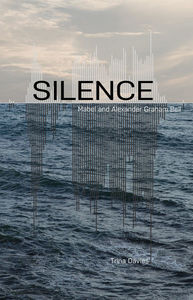Trina Davies' Brilliant New Play, Silence, Brings an Overlooked Figure in History to Centre Stage
It would be hard to find anyone who doesn't know who Alexander Graham Bell, the inventor of the telephone, was. But Mabel Hubbard Bell isn't a name that pops up in many history classes. The untold story of Graham Bell's brilliant and fascinating wife is one begging to be told, and award-winning playwright Trina Davies has done just that in her intimate, unmissable play Silence: Mabel and Alexander Graham Bell (Playwrights Canada Press).
Silence follows Mabel's life, from the childhood scarlet fever that left her deaf, to her courtship and loving, complex marriage to Graham Bell, and onwards to her role inspiring one of the inventions that changed the course of history most profoundly.
A story about how we communicate with one another, how we can challenge each other to do good, and how we overlook essential figures in our own history, Silence has been hailed as "flawless", "delightfully entertaining", and "challenging".
We're excited to welcome Trina to Open Book today to discuss her journey as a playwright as part of our On Stage series for theatre creators. She tells us why she is attracted to writing historical plays to examine the timeless "patterns in human behaviour", what she does with a piece of writing that isn't working, and the very best part of being a playwright.
Open Book:
Do you remember an early experience that you believe contributed to your becoming a playwright?
Trina Davies:
I found a play I wrote when I was eight or nine in an old dusty box a while ago. It was the “mystery of the kidnapped horses” and the opening scene was at a girls’ sleep-over party. For some reason, it didn’t become a hit. I made paper-mache puppets in Grade Three and somehow managed to direct, write, and perform (with various friends) shows that the entire population of my school was forced to watch. I have a vague memory of this.
In truth, though my grandmother’s fondest wish was to have a writer in the family, I never set out to be a playwright. As a teenager I acted when I had the opportunity, and I wrote poetry that was published in a few literary magazines. I believe the entire reason that I am a playwright today was the Citadel Teen Festival of the Arts in Edmonton Alberta. I auditioned with hundreds of other teens and was chosen to work with theatre professionals who were developing and producing new plays on the Citadel stages. It changed my relationship to theatre and taught me how to navigate the process of developing new plays. The professionals that I met kept encouraging me to try writing for the stage. Took me quite a while longer to find a story that I wanted to attempt for the stage – but I would never have tried without the strong grounding that I received from the artists that I met through the Citadel program.
OB:
What has been your most unlikely source of inspiration?
TD:
Being open to the random. A visit to a dusty wax museum in Victoria BC led me on a multi-year journey into the life of Madame Tussaud. I wandered into the museum because I had time to kill, had never seen a wax museum, and thought it would be funny. Random.
Your CanLit News
Subscribe to Open Book’s newsletter to get local book events, literary content, writing tips, and more in your inbox
I try to remain curious about everything. The world, and the people in it, are fascinating. Every day, every moment, can have something new within it. A little spark of curiosity, if I follow it, can lead me on a journey to discovery. I suppose I’m known for writing plays that are historically-set. What I find endlessly interesting are patterns in human behaviour and how we repeat the same events in entirely different contexts, even in entirely different centuries. What is there to learn about these cycles? Why do we make similar decisions in similar, and yet very different, circumstances? What does it mean about us?
I don’t think there’s a point in spending the energy it takes to create a new play if you don’t know why you’re doing it – what does it have to say? What do I have to say? What have I got to say about the times we’re living in now, what is happening at the moment? What are we, as a community, struggling to process?
The inspiration is a random spark, followed by a long journey and a lot of questions.
OB:
What do you do with a play in progress or a scene that just isn't working?
TD:
This might seem simplistic, but either: 1. Run towards it, attack, and fix it or, 2. Walk away. I have no problem rewriting, slashing, and burning pieces in process. I try not to be precious about anything. I will rework scenes, and even whole plays, multiple times before and in-between the phases where I’m working with actors, designers, and directors. The ‘proof’ of a piece or a scene is if it works on its feet when other artists are engaging with it and embodying it. If something seems ‘off’, it is. Fix it.
I’ve rewritten whole scenes in the rehearsal room days before opening, or cut whole scenes during tech. In that case the actors, directors and designers were trying so hard to make it work, but the first time I sat in the audience and saw what was happening, I knew the scene needed to be cut. At a coffee break I talked to the director and designers about the willingness to change all the work they’d done and cut the scene. The play was better for it. As was the production.
But in some cases, walking away is the right answer. Walking away temporarily, going for a walk, letting it sit in the back of my mind for a little while – but not too long. And in rare cases, walking away from a play or concept entirely. I’ve started research on a number of ideas in the past few years. I have shelves of books and pages of notes, but I know that some of them I won’t pursue for any number of reasons. Knowing when to walk away from a concept or an early play saves me a lot of wasted energy and stress. But walking away from a play that is on its way to production, or from a scene that just isn’t working – as far as I’m concerned, that’s not an option. Fix it. Full stop.
OB:
What is the worst thing about being a playwright, and what is the best?
TD:
Worst is having to write the first draft. Best is being in the room with other artists when it’s working.
_____________________________________
Trina Davies is a playwright based in Vancouver, BC. Trina’s award-winning plays include Shatter, Multi-User Dungeon, The Auction, The Bone Bridge, and Waxworks. Her play The Romeo Initiative was a finalist for the Governor General’s Literary Award for Drama in 2012 and was the winner of the Enbridge Playwrights Award for Established Canadian Playwright. Her plays have been performed across Canada and in a number of other countries, including the United States, Germany, Italy, and India. She has participated in artist residencies at the Stratford Festival in Ontario, the Banff Centre for Arts and Creativity, the Playwrights Theatre Centre, and the Bella Vita Playwrights Retreat in Italy.






